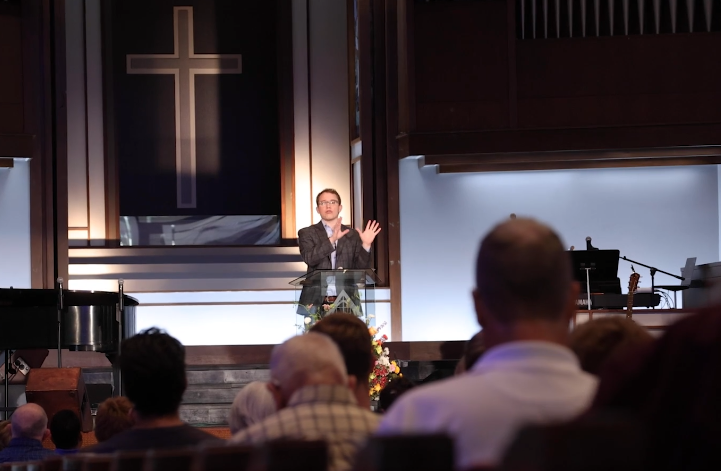
Before becoming pastor of Hope Community Church, formerly McElwain Baptist Church, Jacob Simmons served as minister of singles and pastoral care at Shades Mountain Baptist Church.
As Chris Crain met with the search team for the Birmingham Baptist Association in 2018, he was clear on a focus that would be at the heart of his leadership should he become the group’s next executive director.
“They asked me what I would like to do if called as director,” he said. “I told them it seemed the obvious direction for a successful association was to lean into church revitalization.”
When asked why he felt that way, Crain explained how a strong association requires strong churches. The team agreed and called the Jasper, Ala., native to lead what has since become the Birmingham Metro Baptist Association (BMBA). Since then, the association and area congregations have worked together in revitalizing 15 churches.
“The list of churches seeking to partner or be revitalized continues to grow,” Crain told Baptist Press. “Fifteen is a great start, but the work must continue.”
Shades Mountain Baptist Church has been instrumental in several of those revitalization efforts, investing not only dollars but leaders. Danny Wood, who transitioned this summer to pastor emeritus after leading the church as pastor for 24 years, had never been involved in revitalization until four years ago. However, he sees a widespread need for it.
“We want it to be a partnership, not about expanding the ‘Shades kingdom,’” he said.
It’s important to remember, Wood added, that a legacy church can have a century or more of ministry invested in the community. “You don’t come in and sweep away that history. What we wanted those members to understand is that the ministry will continue. It’s not dead, just ready for the next chapter.”
Located on the east side of the city, McElwain Baptist Church was one of those that Wood felt Shades Mountain could come alongside and partner. McElwain’s congregation came to an agreement that the next chapter of ministry would include assistance from the bigger church. It would also include a name change to Hope Community Church.
In addition to investing funds, Shades Mountain also sent several of its members as well as its minister of singles and pastoral care, Jacob Simmons, to be Hope’s pastor.
“Their people were ready to reach the community and still had the vision. They just needed the bandwidth to do it,” Wood said. “We all put our heads together to see how God wanted us to work together to reach the community.
“It was a beautiful thing. They are so supportive and love Jacob. There’s a lot of energy and excitement now.”
With the churches only 20 minutes apart, there were already some family connections. Shades Mountain senior adult minister Jonathan Payne was McElwain’s minister of music back in the 1980s.
Wood, a trustee for the North American Mission Board (NAMB), first became familiar with NAMB’s efforts in church planting and replanting. Listening to Mark Clifton, NAMB’s senior director of church replanting and rural strategy, also spurred Shades Mountain to get involved.
“It resonated with me,” he said. “If someone can help a church, then it will not only survive but thrive. That became part of our heartbeat, and we’re happy to be a part of this opportunity.”
George Wright, current pastor of Shades Mountain, called it a “tremendous privilege” to pastor a church with a heart for revitalization.
“As a former church planter and a pastor of a legacy church, I have grown to love and appreciate every opportunity that God provides to partner together with other churches for the sake of the kingdom,” Wright said. “And I am grateful for the opportunity that we have at Shades to steward what God has entrusted to us so the next generation can hear and experience the good news of the gospel.”
Crain knew the importance of church revitalization and was convinced it can be effectively done at the associational level.
“We saw several strategic churches – flagship churches – on all sides of the city that were in decline. I knew if we lost the gospel impact of those churches it would be devastating for them and their communities. It would be an existential crisis,” he said.
The stress brought by COVID-19 and other culture issues has led many pastors to resign or even step away from the ministry. Trends such as those impact church health, of course, but also magnify the importance of the local association.
“The compelling story of revitalization resonates with pastors because they want to reach their community and make disciples,” he said.
The process begins with courage. A struggling congregation needs to be willing to give up control in order to be used.
“It takes openness to look at things from a biblical point of view,” said Crain, who also pointed to NAMB in helping the BMBA develop a revitalization strategic process. “Churches can be fearful over losing control or what they like about church instead of what God might do in their community if they are revitalized.
“It takes a lot of humility for that. It takes a lot of courage to be able to admit we don’t have it all together and need help.”
(EDITOR’S NOTE – Oct. 17-24 is designated as a week of prayer for Baptist associations. Scott Barkley is national correspondent for Baptist Press.)


